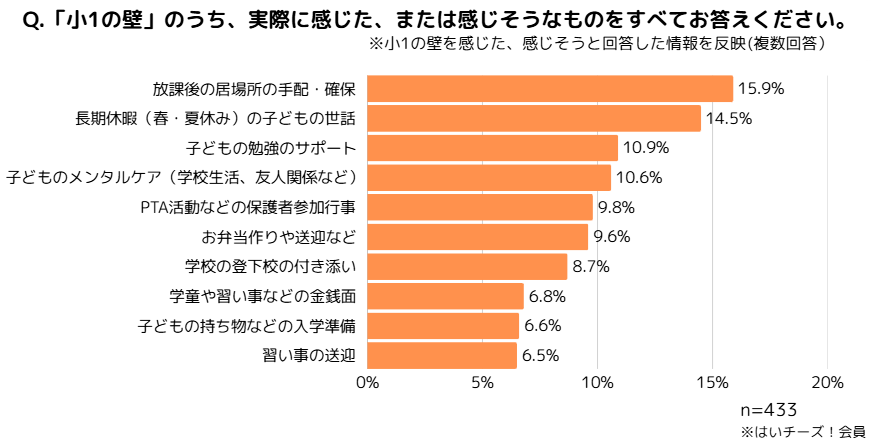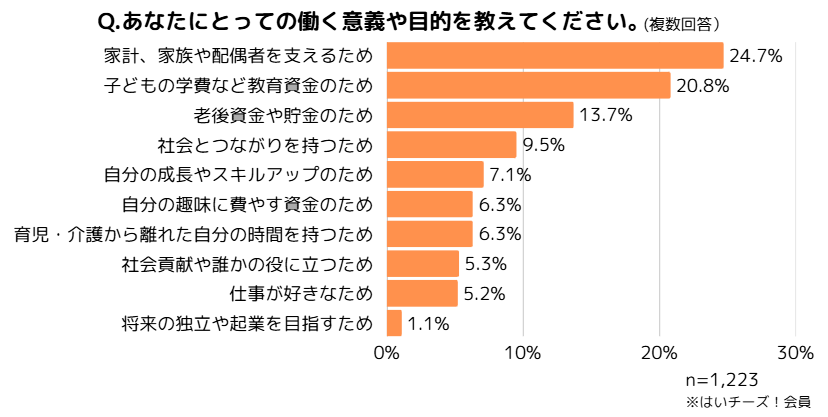~The biggest issue is "after-school care," and cooperation between the home and the workplace is the key.
- The following is content from the press release -
(headquartered in Chiyoda-ku, Tokyo; Nobuaki Chiba, President & CEO; hereinafter "Sen"), a provider of comprehensive childcare tech service "Hai Cheese! (headquartered in Chiyoda-ku, Tokyo; Nobuaki Chiba, President & CEO; hereinafter referred to as "Sen"), a provider of childcare tech services that aims to create happiness for children through the power of photography and food, conducted a "Survey on Awareness of the First Grade Barrier" among 1,223 child-rearing generations.

Survey Background
The "first grade wall" refers to the difficulties faced by parents when their children enter elementary school due to adjustments in their daily lives and work styles, as well as the time gaps in childcare and schooling. Although we are currently in the midst of the summer vacation period, the reality of the "first grade wall" is becoming more apparent as worries unique to elementary school life, such as how to spend daily life, where to leave children, and how to deal with school-age children, become more apparent. We have conducted this survey to explore the concerns, needs, and challenges of parents after their children enter elementary school.
Topics of Survey Results
■Slightly less than 40% of parents said they felt a barrier in the first grade
It was revealed that 35.41 TP6T parents felt the "first grade barrier," which is the imbalance between work and home life that is triggered by the start of elementary school.
Parents are perplexed by the "gap between preschools and daycare centers" and the "unexpected" burden that hits them.
Many parents were perplexed by the differences from their preschool days, such as "the shortened hours of care for school-age children" and "support for home study." Some said they felt unprepared for the increased mental and physical burdens.
The biggest challenge is "securing a place to stay after school.
The most pressing issue for parents facing the "first grade wall" is "arranging and securing a place to stay after school," followed by "taking care of children during long vacations" and "home study support.
The key to overcoming "barriers" is "cooperation at home" and "flexibility at work.
The most frequently cited response was "spouse's understanding and cooperation," followed by "after-school placements," "flexible work arrangements," and "understanding at the workplace. The results indicated the importance of "teamwork" within the family and workplace as well as the system.
More on topics in the survey results
Nearly 40% "felt/will feel the 1st grade barrier"
The "first grade wall," or the "first grade barrier," is the moment when the balance between work and home life is suddenly disrupted by the start of elementary school. The survey revealed that nearly 40% of parents feel this "barrier. The time for children to leave school earlier than when they were in preschool, the number of school events and homework assignments has increased, and parents now have a new way of interacting with their children, in which they are expected to "take care of themselves. These daily changes have a significant impact on the division of roles and work styles in the home, leaving many families feeling confused and anxious.

The biggest challenge is "where to leave them after school."
The most critical issue for parents facing the "first grade wall" is "arranging and securing after-school places for their children. When asked to select the items they felt needed to be addressed, the item that received the most votes was "Arranging and securing an after-school care home" (15.9%). This was followed by "taking care of children during long vacations such as spring and summer vacations" (14.5%) and "support for children's studies" (10.9%). For families who continue to raise children while working, spending time with children after school and during long vacations is a real hurdle that affects work/childcare balance. Many parents also cited "mental care for children," "events attended by parents," "packed lunches and transportation," and other hard-to-see burdens and psychological pressures, highlighting the multifaceted burdens that parents face.

Decrease in full-time employee rate from 62.8% to 61.1% due to the "first grade wall" Slight increase in part time employees and job turnover
Of the parents who responded that they "feel the first grade barrier," 62.8% were working as "full-time, contract, or outsourced" employees before entering elementary school. However, after entering elementary school, that percentage decreased slightly to 61.1%. On the other hand, more flexible work styles, such as "temporary or part-time" (from 15.3% to 17.1%), showed a slight increase.
This slight change is not enough to make the parentsI had to change the way I work.The reality is showing. Unlike daycare centers, there are many cases in which the traditional work schedule makes it difficult to balance work and family life when the hours of care and support system for schoolchildren are not sufficient.

The key to overcoming "barriers" is "cooperation at home" and "understanding at work.
The factor most frequently cited as necessary to overcome the "first grade barrier" was "spouse's understanding and cooperation" (31.01 TP6T). This was followed by "childcare for school children and after-school places," "flexible working hours," and "understanding of the workplace, including superiors and coworkers. These results indicate that the key to overcoming barriers is not only systems and support structures, but also cooperation within the family, a safe environment for children, flexibility in working styles, and understanding at work. On the other hand, "use of housekeeping services or kids' sitters" received zero votes. While these services are highly convenient, the cost, psychological hurdles, and regional differences make them difficult to use.Not seen as a realistic option.It is suggested that this is a possibility.

The Reality of the "First Grade Wall" as Seen from the Frontline
While the start of elementary school is a milestone in a child's development, it also brings about significant changes and burdens for families. The "first grade barrier" is not merely a systemic problem, but is also the result of a series of "small difficulties" that lurk in the daily lives of children. When we asked those who responded that they "felt the wall" in the first grade to write freely about their experiences and episodes of difficulties they faced when their children entered elementary school, the most common response was "preparing for school entry and writing names. This was followed by many concerns about "balancing school, school-age children, and work." It emerged that parents are burdened by both the physical preparation and the time commitment.
Invisible barriers in preparing for school entrance and selecting school-age children
- I was informed of the required items at the pre-enrollment orientation.However, there are many detailed specifications for even a single piece of stationery, such as a plain white underlay, and to be honest, it is tough to prepare everything in a month and a half.
- I was very frustrated because it took so long to apply for and decide on a school-age child. I was told that if I was working, I could get all the first graders in, but I had to think of other ways to find a way to get them in, just in case.It was nerve-wracking.Also,I was astonished that there was no place to leave my child at the time of class closure.
Race against time, days premised on parental support
- For checking and circling homeworkIn the early grades, there is a lot of homework that cannot be done by the child alone, such as homework that requires a lot of time. While the children have their hands full with dinner and bath when they get home, there is also a lot of homework that they cannot complete by themselves in the early grades, such as circling and accompanying children in reading aloud,Every day is really hard.It is.
- Although I used extended daycare at the daycare center, it was very difficult for me to adjust my work hours because the school children at the elementary school stay until 6:30 p.m. In addition, during the long vacation period of the elementary school, the school children start taking care of the children after 8:30 a.m,Without understanding in the workplace, it is difficult to continue working as a full-time employee.I realized once again that I was not able to work as a full-time employee. While I heard from those around me that they were no longer able to work as full-time employees, there were many occasions when I felt blessed, and this made me want to contribute to the best of my ability in my work.
Children's instability and difficulty in mental health care
- Care for children after enrollmentThe children had a hard time with the teachers at the elementary school and the school children were crammed into a small building. He did not get along with the teachers at the elementary school, and the children were crammed into a small building at the school, which made him feel uncomfortable. It was difficult to take care of the children while continuing to work,I had no choice but to resign.
- At school, he did his best in 120% and nothing went wrong and he was regarded by his teachers as a "can-do" child, but at home, the repercussions were huge.The tantrums were severe.Between "what I want to do" and "what I have to do," it is difficult to prioritize and get things done.It was also a conflict between parents and children. It took a lot of time and emotional support.
These voices indicate that the "first grade barrier" is not simply a systemic problem. It is a reality that requires a "rethinking of the entire lifestyle" that cannot be overcome by "preparation" alone.

The survey revealed that the "first grade barrier" is not simply a systemic deficiency, but rather a "daily life issue" deeply rooted in the circumstances of each family and the individuality of each child. Even small issues such as after-school childcare, home study support, and parental involvement in events can add up to a heavy burden on families. The most frequently cited keys to overcoming these "barriers" were "cooperation with spouse" and "understanding at work. In a reality that cannot be solved by the system alone, "teamwork" among families, workplaces, and communities is being called into question. The entrance of a child into elementary school is a major turning point for parents as well, as they reevaluate their working styles and family management. It is not a matter of "leaving it up to the family" or "leaving it up to the system. It may be necessary to reconstruct a viewpoint and system that supports child-rearing by society as a whole.
Parents raising children were asked why they work: for their families and to "connect with society.
In this "Questionnaire on the First Grade Barrier," all respondents were asked about the significance and purpose of working. The most common answer was "to support my family and spouse" (24.7%). This was followed by "to finance children's education" (20.8%) and "to fund retirement and savings" (13.7%), indicating that a sense of financial responsibility is the main reason for the desire to work. This trend is considered to be even stronger against the backdrop of the current social situation, where prices continue to rise.
Notably, however, the top response was "to connect with society" (9.5%). A certain number of respondents also chose "for myself" such as "for personal growth and skill improvement" (7.1%) and "to have time for myself away from childcare/nursing care" (6.3%). The current situation is that the meaning of working is not only "to make a living. For parents who tend to lose touch with society during the child-rearing years, work is a "place to have a role" and a "way to reconnect. The survey revealed that such a way of working is spreading, in which parents reaffirm their value and place as individuals while working for their families.

Survey Summary
Survey Method : Yes Cheese! Web-based survey of members
Surveyed by: Yes Cheese! Members (*) 1,223
Survey period : February 10 - 17, 2025
*Yes, cheese! Members = Parents with preschool, kindergarten and school-aged children
Yes cheese! is

The company's motto is "Peace for Children! (https://sencorp.co.jp/service)" is a comprehensive childcare tech service that aims to nurture children's happiness together with daycare centers, kindergartens, and other childcare facilities and parents under the motto of "Peace for Children".
We provide total support for seasonal events such as athletic meets and recitals, from photography to sales and response to inquiries, through our photo-specific Internet photo sales service "Hai Cheese! Photo", the childcare ICT "Yes Cheese! System", album production "Hi-Cheese! Album," and the video recording service "Hi-Cheese! Movie" to record children's memories, and the school lunch and nutrition education service "Hai Cheese! Vege" supports the healthy growth of children. We provide services that approach both the physical and mental aspects of children's lives so that their future lives will be richer and full of happiness.
Sen Corporation Company Profile

President and Representative Director: Nobuaki Chiba
Head Office : 1-3 Kioi-cho, Chiyoda-ku, Tokyo
Tokyo Garden Terrace Kioicho Kioi Tower 14F
Establishment : October 2004
HP :https://sencorp.co.jp
Yes Cheese! is a registered trademark of Sen Corporation.
Yes Cheese! is a registered trademark of Sen Corporation.














